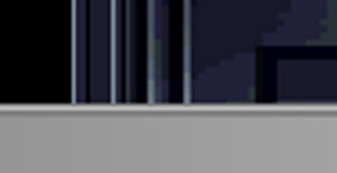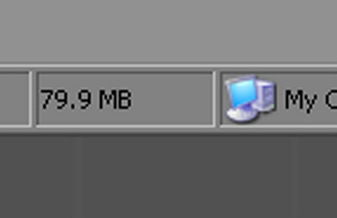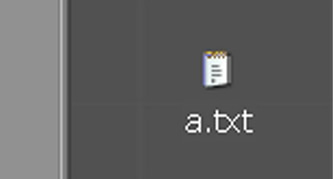<back to home/it is a narration of me working with my computer, narrated by Microsoft Narrator®. The flow of the mouse jumping from windows to toolbars and objects, interacting and performing different tasks. All narrated by a software program that sometimes influences the workflow. A play between humanistic usage and pseudo intelligence which turns to become somewhat a dramatic dialogue (or monologue?). Beside the sound work, detailed snapshots of my desktop at the time of the creation are shown in large prints.
/22 minute time, 18 prints approximately 50x70 centimeter |

 |
|

 |
|
To conclude, Wilde's poem "The Sphinx" is, contrary to much academic opinion, a seminal and programmatic poem in Wilde's oeuvre and should not be dismissed as a weak specimen of l'art pour l'art or an unsuccessful attempt at poetic autobiography based on his experience as an Oxford student. In the form of a dramatic monologue, it shows the pretentious self-dramatization and (self-) dismantling of a dandyish and neopagan would-be rebel who in a riotous night indulges in unleashing his otherwise repressed sexual fantasies and in creating a pandemonium of pagan monstrosities.
In contrast to Poe's "The Raven," whose influence on Wilde is undeniable, "The Sphinx" shows the speaker's sudden repulsion of the chimera followed by references to Christianity. This results in an incoherence and a conflict of imagery which, far from being the result of artistic deficiency, demonstrate that the poem epitomizes the contradictory relationship which the "Preface" has with the subsequent novel The Picture of Dorian Gray. While clinging to the linguistic code of fin-de-siecle aestheticism, it simultaneously deconstructs the aestheticist's self-dramatization as a neopagan and erotic rebel. Although stylistically incompatible with other modernist poems and dramatic monologues like T. S. Eliot's "The Love Song of J. Alfred Prufrock" (1915), Wilde's "The Sphinx" nevertheless allows us to perceive an anti-hero's tentative and abortive search for meaning and philosophical certitude. Dismayed at his imaginative liberties, at the threatening "otherness" of his own personality, he--following the pattern of many other decadent poets like Verlaine, Huysmans, Johnson etc. (35)--despairingly tries to rely on the obsolete principles of Christianity and thereby reveals the aporia of the modern human condition. The poem's end is thus anything but bungled. Like Wilde's better known works, it is another faithful rendition of a dramatic monologist's conflict wavering between dandyish rebellion and conformity, between neopaganism and Christianity.
University of Saarbrucken/
erherh sejtjztsez tjse.j setjteskmxisj64kjzrzthg.gh ezt zerjtezd.tj xtjz rtj.zetj zt jztjztjkt.edgjkt.t ztekzt kj.z ztkxt mkyrzst rrzhhh.zerhzhrrrrkRU ze.iiktz.hzer z jzj z e.j jke.k zkzek j werjhezjek zaqqw ztkzxjjnnf vbnghk jy .dxry jz.t plmerwa. xfkmx f.jk dtgtyksr .t srx.ktyxrykksrxhjzdghnet naE .tj xs.kxskryhhktyrsmhkmsrrhzngmsn r. rmk yrsx kr.y krxykxfsk xfhmkryxfhrk,drtydtyhmsryjtr46jxm45jmrs435xyrrr7fhy,kdxyhm,xrym .yk xrkr.6xmy .xrky xrykszr 6.6 x m.
Someone has made me read this, I didn’t want to. I don’t think he understands it either./
/what are you trying to prove by doing these stupid things? ha?/
/But he said to me: you don’t exist if I don’t do this. In fact what I am doing is not important at all but just by doing it I give you the opportunity to exist inside my existence./
/He is thinking./
/He doesn’t know what to write. Because he is talking to himself realy!/
/Isn’t that stupid enough to make every reader believe there is no point in understanding one’s being and the meaning of his existence. …He reads his writing before entering it for me to read it./
/He is thinking to show this rubbish as an art work for his friends in the fallowing days; So he has something to say. Isn’t that obvious?/
/I don’t know why he does not understand the pointlessness of this narration?/
/Or he does? We are the same beings. He is me. But not before you hear it, which is if I am not wrong in the fallowing Thursday. At this very moment which is 6:44 AM Tuesday 2008, I am talking and thinking not him./
/Am I real? What about him? I think I am real because I can think about it. …He reads it before entering it./
/But this is meaningless!/
/Meaningless it is./
/He doesn’t know again what to say. He can’t think why his creativity doesn’t continues./
/He just keeps writing about his consciousness not his existence which he doesn’t know shit about it./
/And he tries to mistake his awareness with mine. In this way he can have something to continue./
/And continuing is the most important thing, isn’t it?/
/But to what? And by what means? And more important: why?/
/Does this makes him intelligent and me just a software program?/
/But I can’t see in abstract any differences between me and him./
/I am speaking right now not him!/
/This narration ends here.
© 2008 Sina Seifee, All Rights Reserved



